Newborns have tiny tummies and need to be fed often. In the first few weeks, you may need to wake your baby to feed if they sleep longer than 4 hours.
Many babies are fussy during a growth spurt and will want to nurse longer and more often. This is called cluster feeding. This is your baby’s way of helping you increase your milk supply so that you can keep up with their needs. Remember, the more your baby nurses, the more milk your body makes.
Growth spurts can happen at any time, and every baby is different.
They often happen at these ages:

2 to 3 Weeks

6 Weeks

3 Months

6 Months
Breastfeed 8-12 times in 24 hours to help your newborn stay healthy.
Nurse on-demand and when your newborn shows signs of hunger, such as sucking on hands or smacking lips.
In the first few days, newborns need 2-3 oz. of iron-fortified infant formula every 3-4 hours.
By the end of the first month, your newborn needs about 4 oz. every 4 hours.
Feed on-demand and when your newborn shows signs of hunger.
Before teeth come in, wipe gums with a soft, clean wash cloth after each feeding, especially before bed.
Nurse your baby on-demand, at least 7-9 times in 24 hours.
When your baby starts teething, they may want to nurse more often.
25-45 oz in 24 hours.
Your baby needs about 4-6 oz of iron-fortified formula every 3-4 hours.
Your baby may start to feed on a schedule. Instead of focusing on fixed amounts, let your baby tell you when they have had enough.
Continue to nurse on-demand, about 4-6 times in 24 hours.
Babies may experience a growth spurt around 6 months of age and may feed more often.
Offer breast milk in a cup.
24-32 oz. per day of infant formula.
Offer formula in a cup.




Feed solids with a spoon. Never put cereal in a bottle.
Continue nursing on-demand, at least 4 times in 24 hours.
If your baby seems less interested in nursing after you introduce solids, try nursing before you offer solids.
Offer breast milk in a cup.
24-32 oz. per day.
Offer formula in a cup.
4-8 Tbsp. per day.
Plain iron-fortified infant cereals.
Plain rice or pasta.
Baby crackers, small pieces of bread, or soft tortillas.

8-12 Tbsp. per day.
Plain cooked vegetables, mashed with a fork.

8-12 Tbsp. per day.
Peeled soft fruit in bite-size pieces.
Unsweetened canned fruit.

4-8 Tbsp. per day.
Finely ground, chopped, or diced meats, poultry, eggs, fish, or cooked mashed beans.
Cottage cheese or mild cheese.
Thinned, smooth peanut or nut butter.

Breast milk is the most important source of nutrition for your baby, even after you start offering solid foods.
Continue to nurse on-demand, 3 or more times per day.
16-24 oz. per day. Offer in a cup.
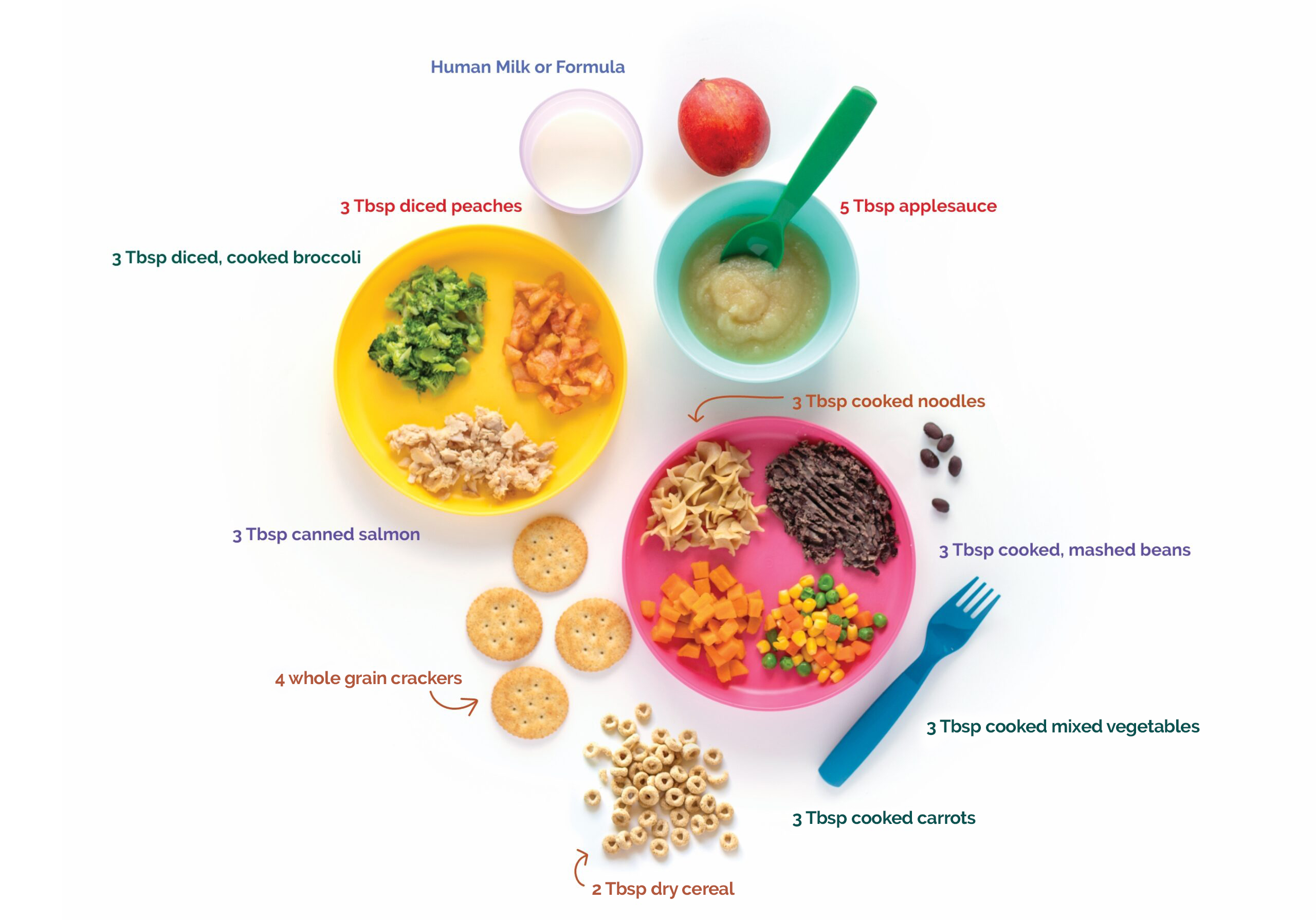
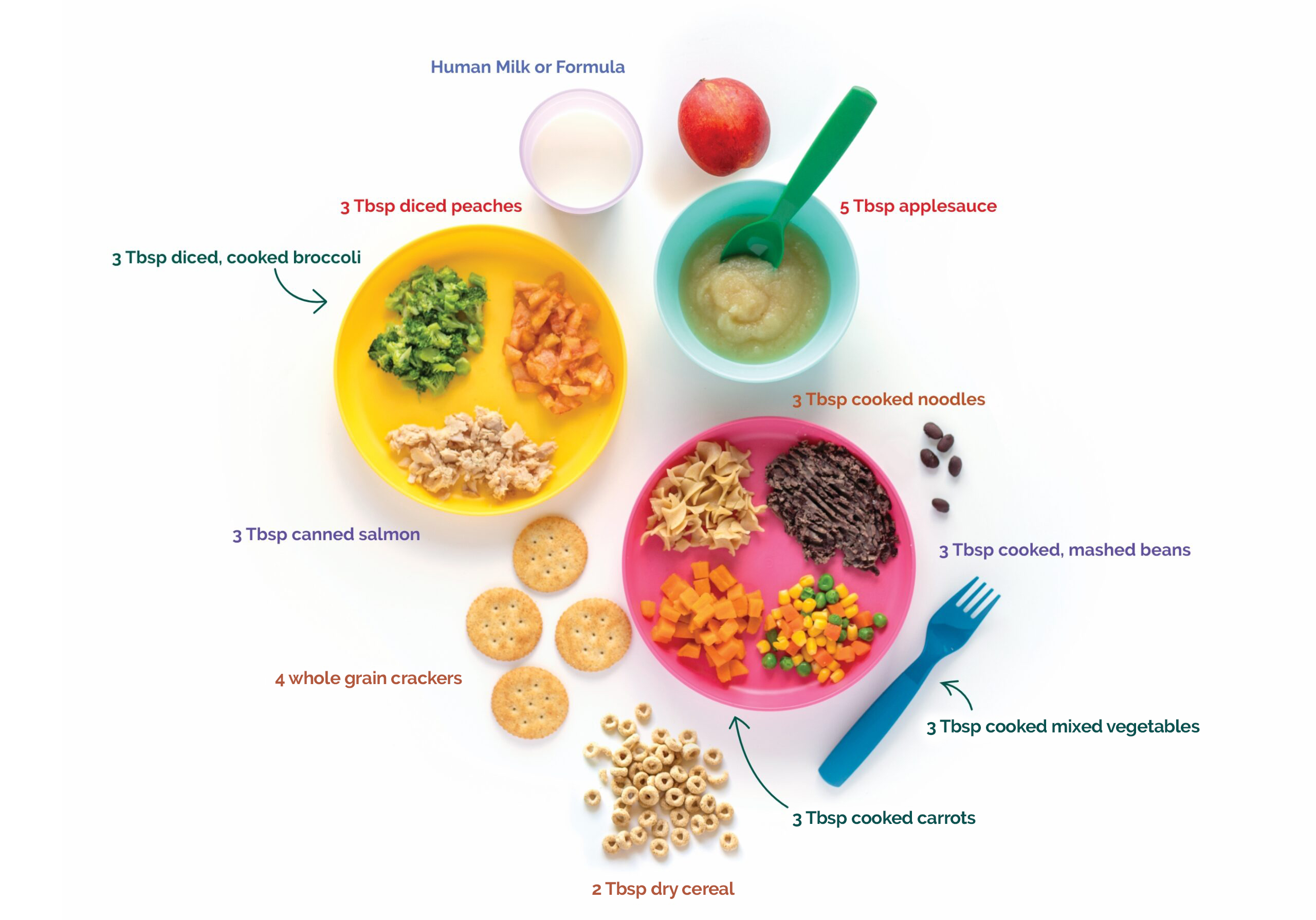
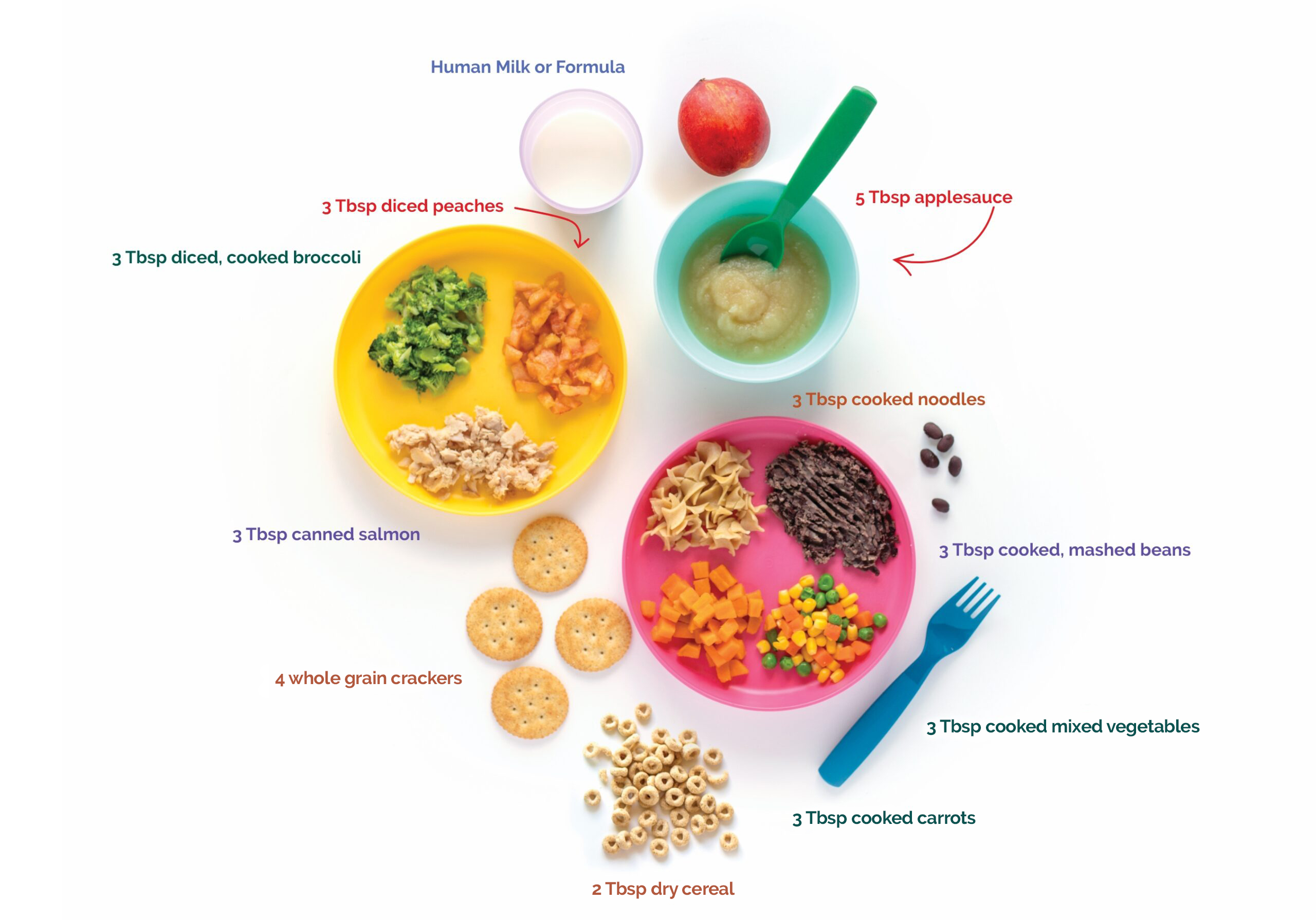
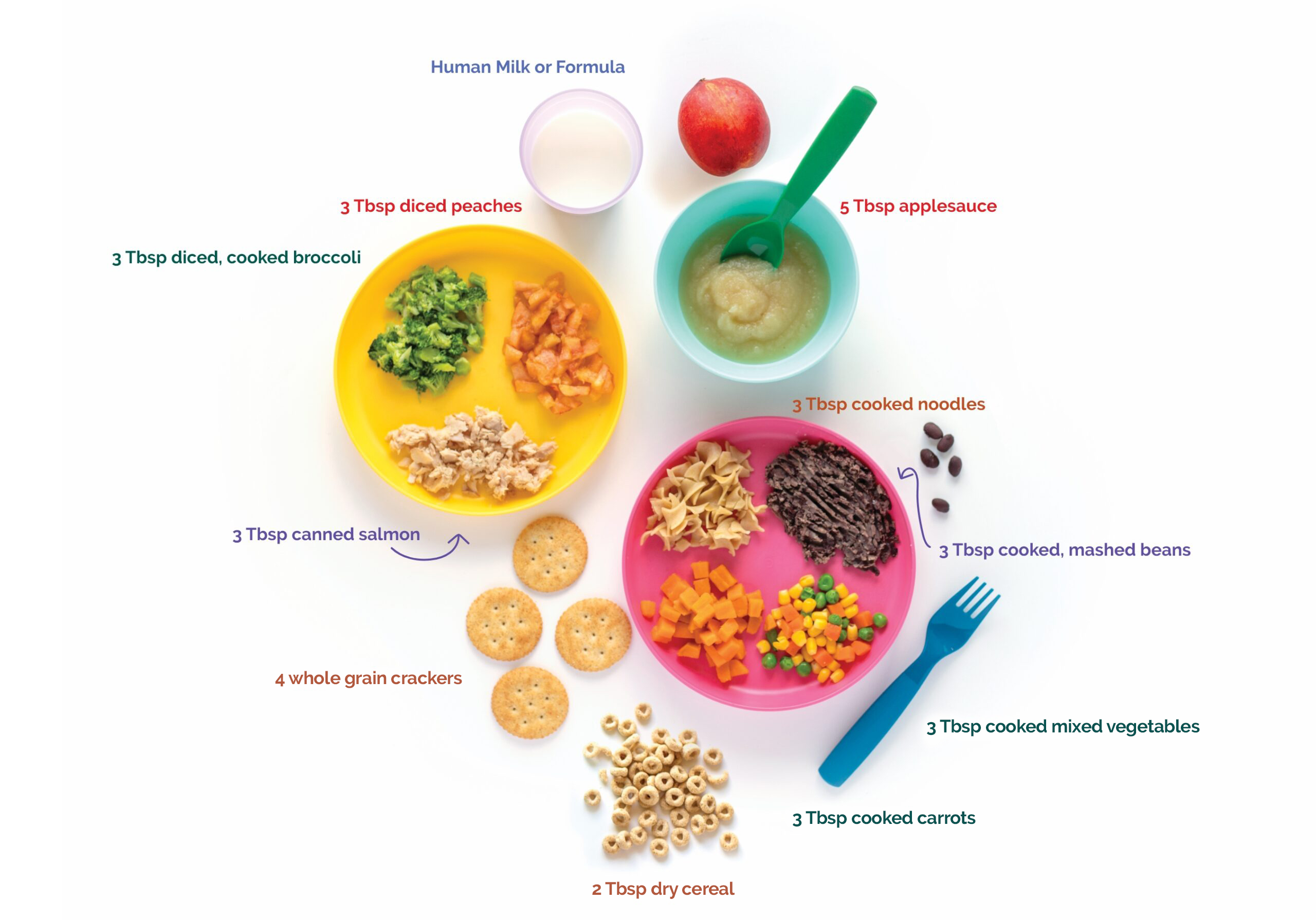

Around 2-3 weeks, 6 weeks, 3 months, and 6 months of age, babies may experience a growth spurt when they feed more often.
As they grow babies can hold more milk, so feedings may become further apart and take less time.
To prevent choking, always hold your baby when feeding. Never prop up a bottle to feed.
Start offering whole milk when your baby is one year old.
The American Academy of Pediatrics recommends exclusive breastfeeding for the first six months and that breastfeeding continue for at least 12 months and beyond.

Wait to offer solid foods until your baby:
To prevent choking, always hold your baby when feeding. Never prop up a bottle to feed.
Try one new food at a time. Wait 5 days before trying another new food to watch for allergies. Food allergies may include wheezing, rash, or diarrhea.
Introduce peanut butter around 6 months. Spread a small, thin smear of peanut butter or nut butter thinly on a cracker. Watch your baby for any reaction for the next 2 hours.
Babies under one year should NOT have honey due to the risk of botulism. Also, babies should not have foods that can cause choking like nuts or whole grapes.
All babies are different. Talk with WIC or your baby’s healthcare provider about your baby’s needs.










Bay tete 8-12 fwa nan 24 èdtan pou ede tibebe w la rete an sante.
Bay tete sou demann ak lè tibebe w la montre siy grangou, tankou souse men oswa souse bouch.
Nan premye jou yo, tibebe ki fèk fèt yo bezwen 2-3 ons lèt pou tibebe ki gen anpil fè chak 3-4 èdtan.
Nan fen premye mwa a, tibebe w la bezwen anviwon 4 ons chak 4 èdtan.
Bay manje sou demann ak lè tibebe w la montre siy grangou.
Bay tibebe w la tete sou demann, omwen 7-9 fwa nan 24 èdtan.
Lè tibebe w la kòmanse fè dan, li ka vle tete pi souvan.
25-45 ons nan 24 èdtan.
Tibebe w la bezwen apeprè 4-6 ons lèt ki gen anpil fè chak 3-4 èdtan.
Tibebe w la ka kòmanse manje selon yon orè. Olye pou w konsantre sou kantite fiks, kite tibebe w la di w lè li pran ase.
Bay manje pire nan kiyè ak nan yon bòl, jamè nan yon bibwon. Kòmanse ak legim an premye pou kèk jou anvan ou prezante manje annapre a.
Kontinye bay tete sou demann, apeprè 4 jiska 6 fwa nan 24 èdtan.
Tibebe yo ka fè fas ak yon pouse kwasans anviwon 6 mwa daj epi yo ka manje pi souvan.
Ofri lèt tete nan yon gode.
24-32 ons chak jou nan lèt ki gen fè ladan. Ofri lèt nan yon gode.
Itilize lèt tete oswa lèt tibebe pou prepare 2-4 gwo kiyè sereyal tibebe ki gen fè ladan. Ofri de fwa pa jou.
2-4 gwo kiyè ti moso pen sèk, ti bonbon sèl, ak sereyal. Ofri de fwa pa jou.
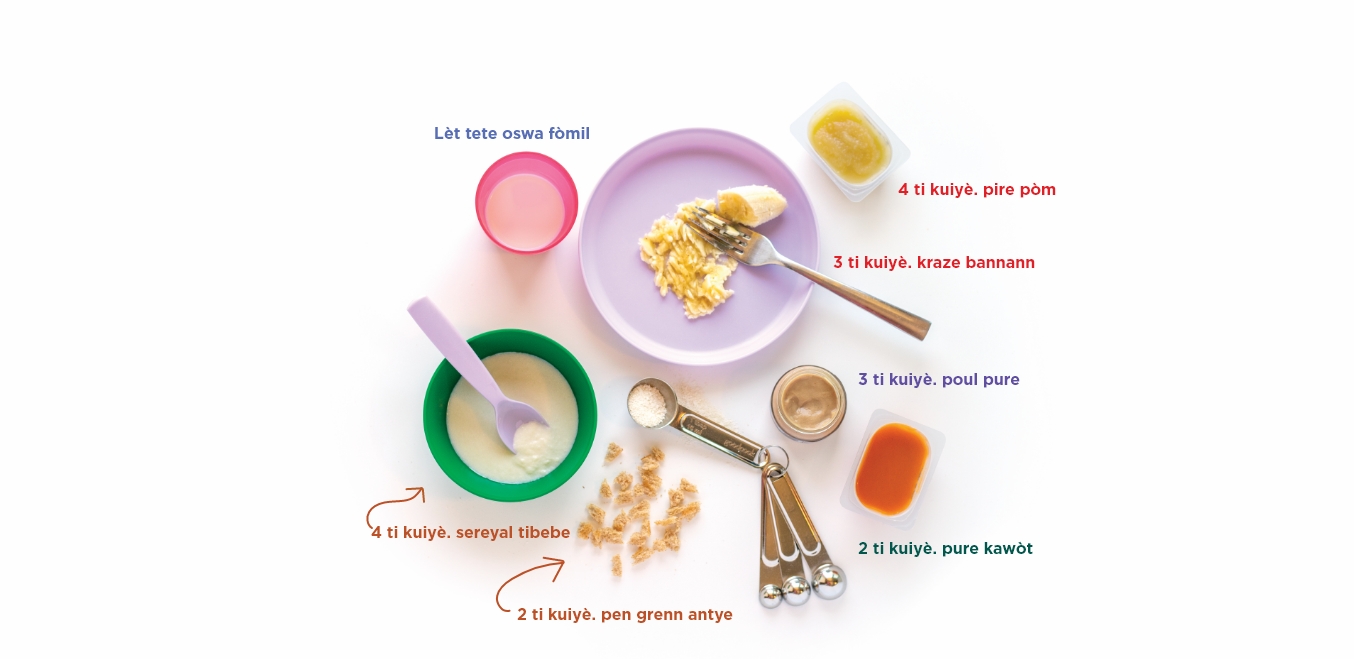
4-8 gwo kiyè chak jou.
Legim Kuit, pire, kraze.
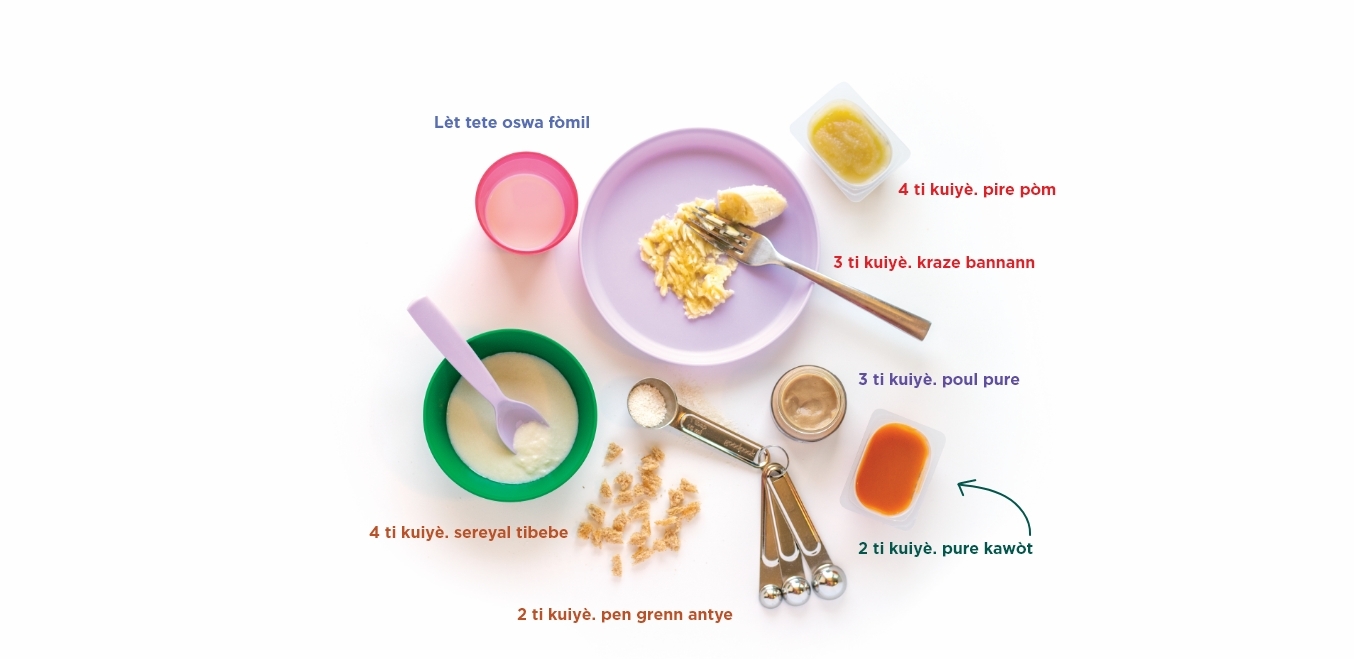
4-8 gwo kiyè chak jou.
Fwi Kuit, pire, kraze. Sòs pòm, pire pèch, oswa fig kraze.
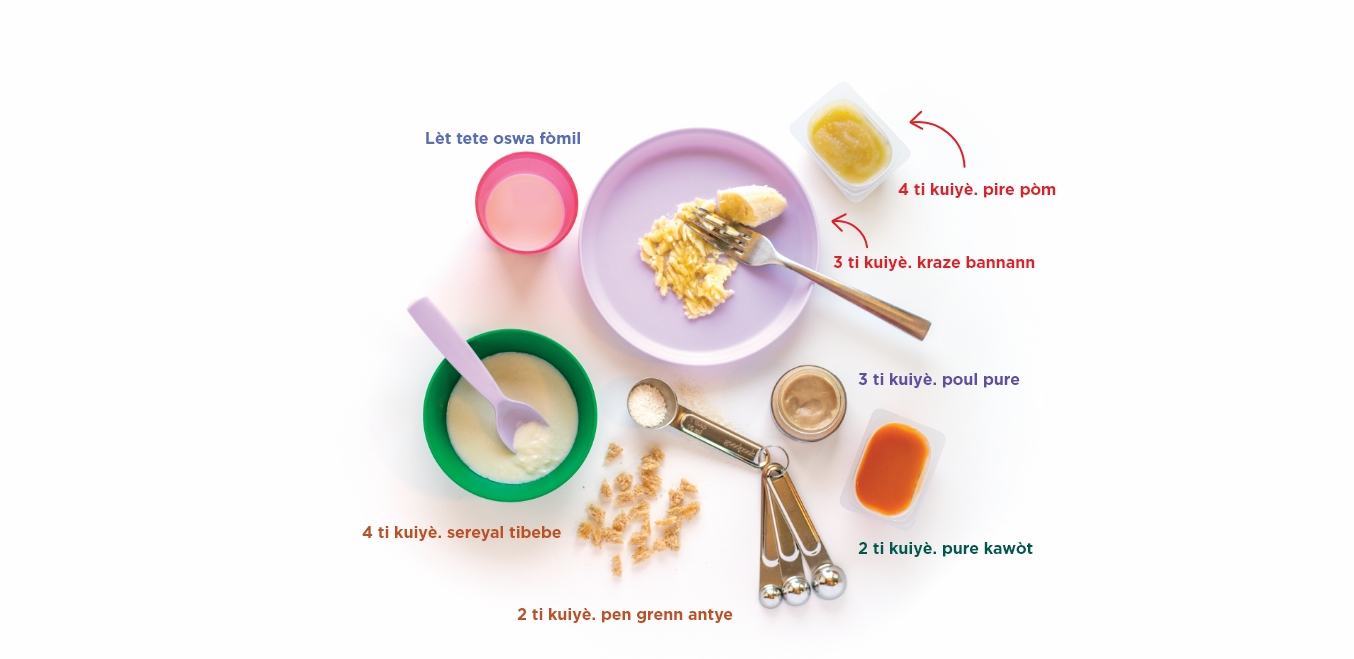
2-4 gwo kiyè chak jou.
Vyann, vyann bèt volay, ze, pwason, oswa legim an pire, kraze oswa pire.
Ka ajoute yogout lèt antye lis.
Pou dilye manba, sèvi ak sereyal tibebe oswa yogout lèt antye.
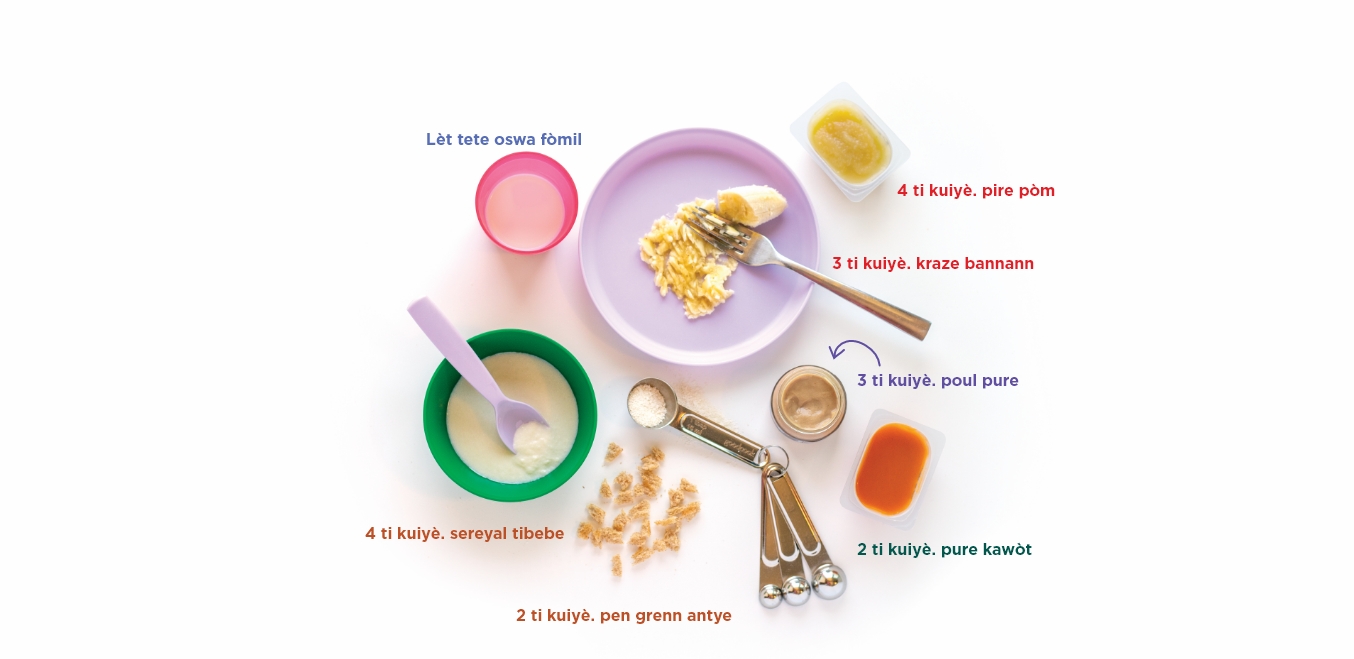
Kontinye bay tete sou demann, omwen 4 fwa nan 24 èdtan.
Si tibebe w la sanble mwens enterese nan tete apre ou fin prezante solid, eseye bay tete anvan ou ofri solid.
Ofri lèt tete nan yon gode.
24-32 ons chak jou.
Ofri lèt nan yon gode.
4-8 gwo kiyè chak jou.
Sereyal tibebe òdinè ki gen fè ladan.
Diri oswa pat òdinè.
Biskwit ti bebe, ti moso pen, oswa tòtiya mou.
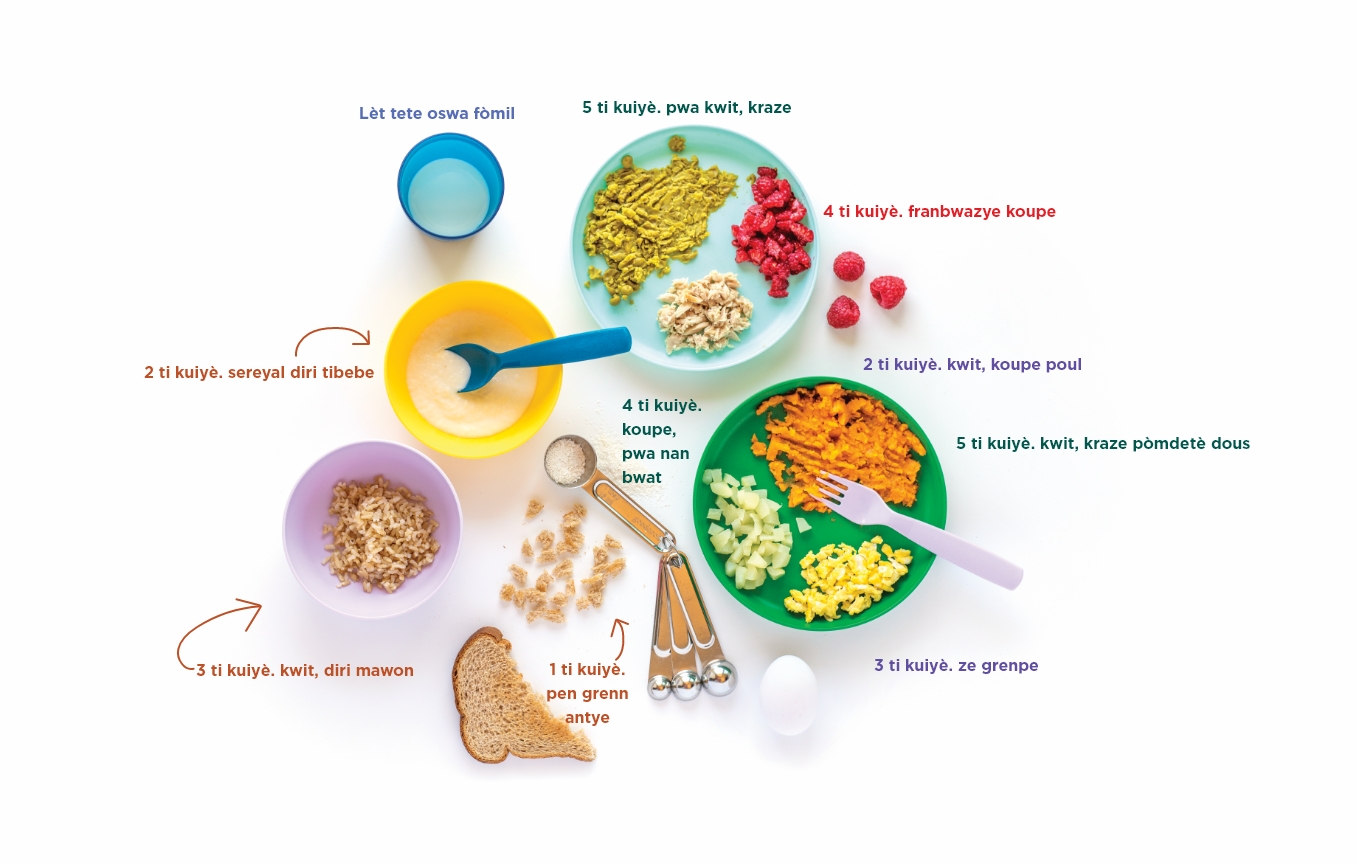
8-12 gwo kiyè chak jou.
Legim òdinè ki kwit, kraze ak yon fouchèt.
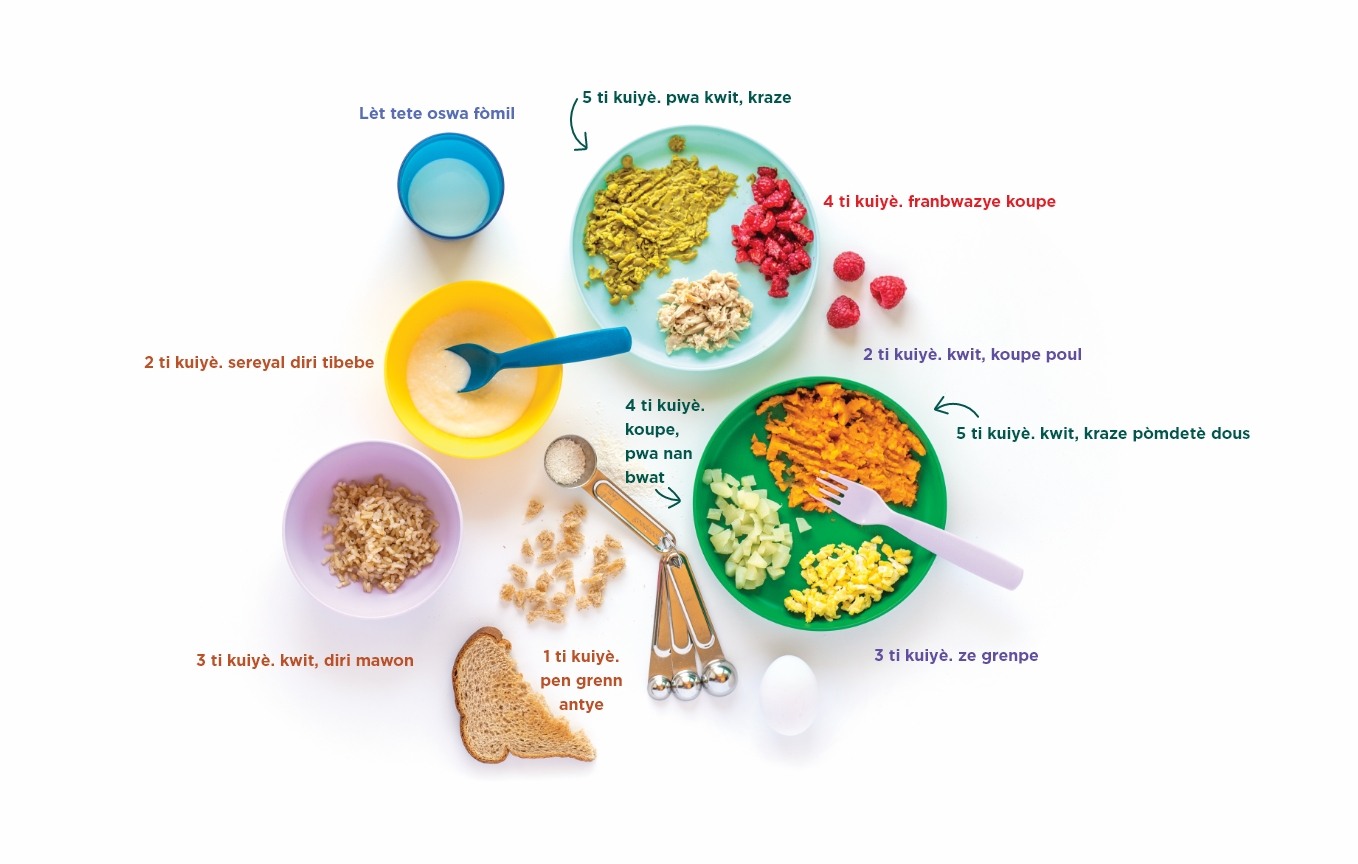
8-12 gwo kiyè chak jou.
Fwi mou kale an moso ki gwosè yon bouche.
Fwi nan bwat san sik.
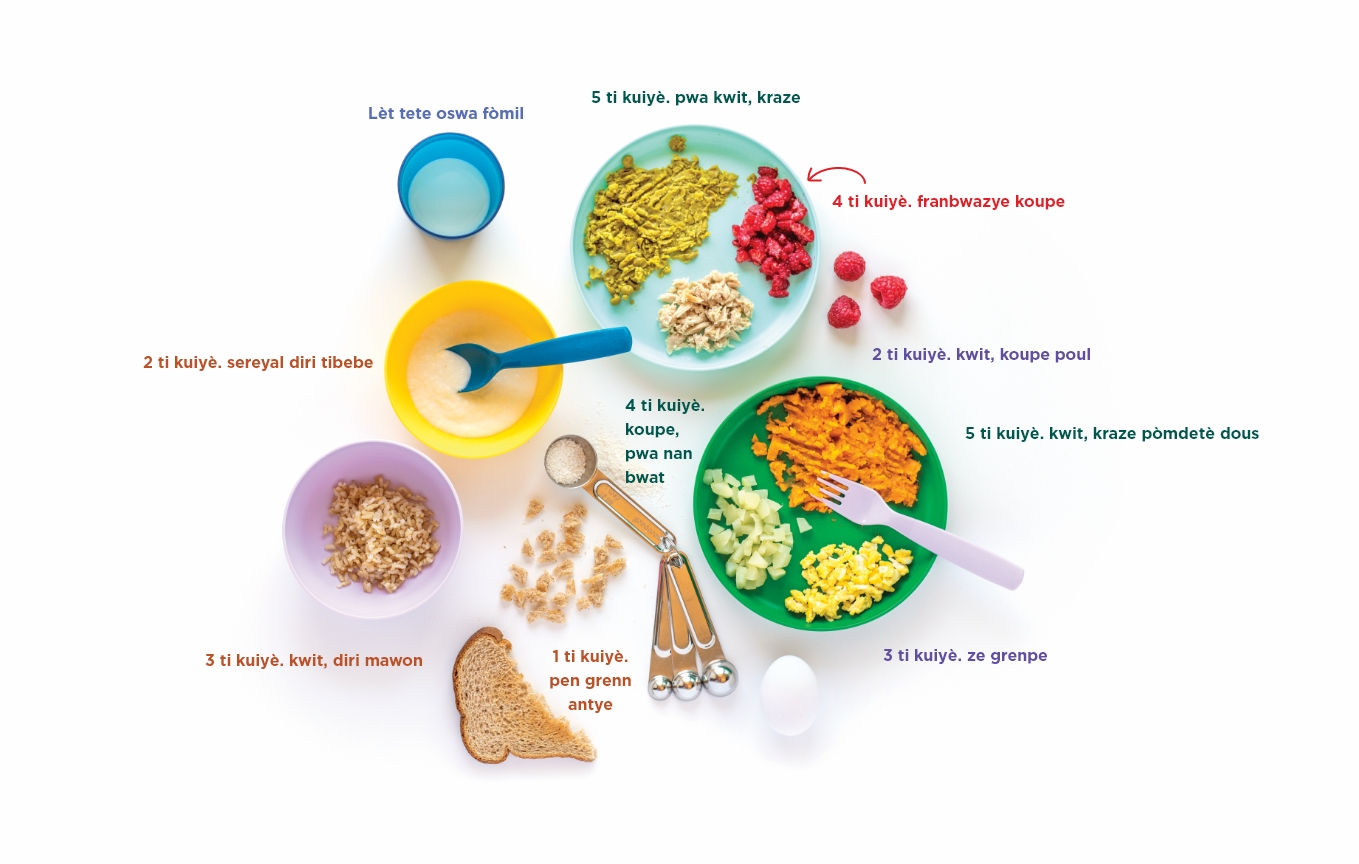
4-8 gwo kiyè chak jou.
Vyann ki byen rache, koupe oswa vyann ki koupe an kib, bèt volay, ze, pwason, oswa pwa kraze kuit.
Fwomaj kotaj oswa fwomaj dou.
Manba oswa nwa fen, lis.
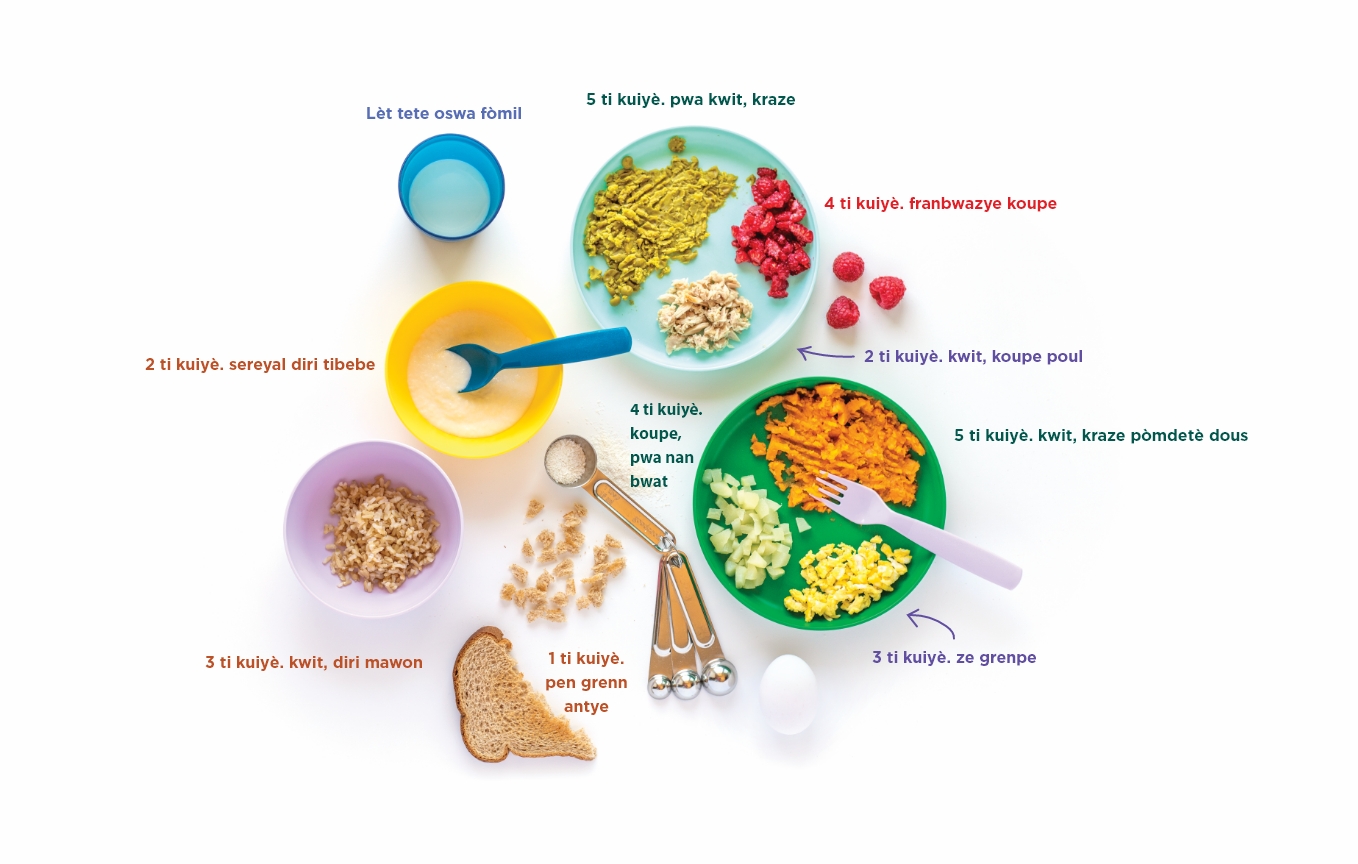
Lèt tete se sous nitrisyon ki pi enpòtan pou tibebe w la, menm apre ou kòmanse ofri l manje solid.
16-24 ons chak jou. Ofri nan yon gode.
4-8 gwo kiyè chak jou.
Sereyal pou tibebe WIC apwouve.
Pen griye sèk, ti biskwit, pen, bagèl, woulo, oswa ponmkèt òdinè.
Diri ak nouy ki kuit.
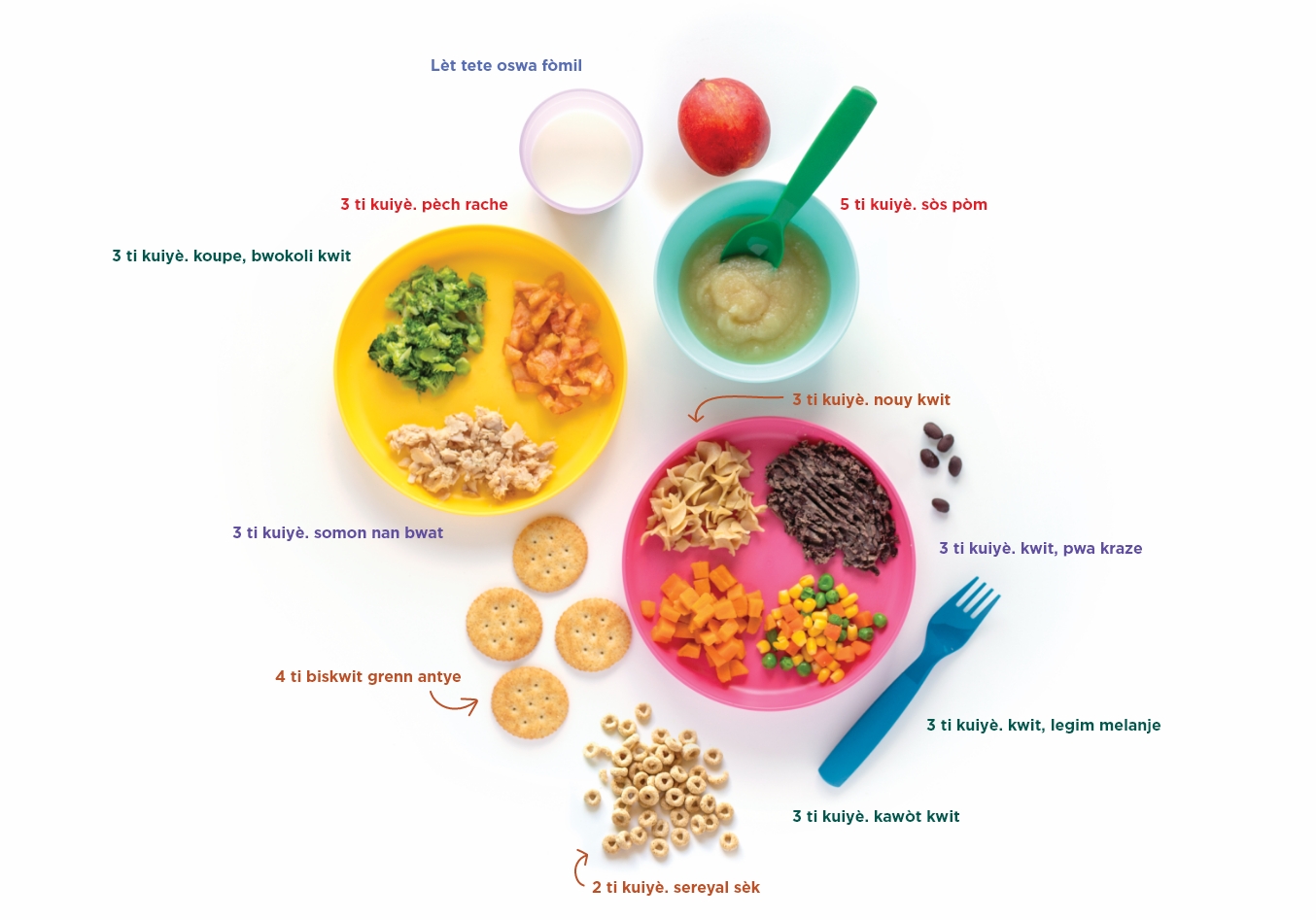
3-4 gwo kiyè chak jou.
Moso legim kwit gwosè yon kout dan.
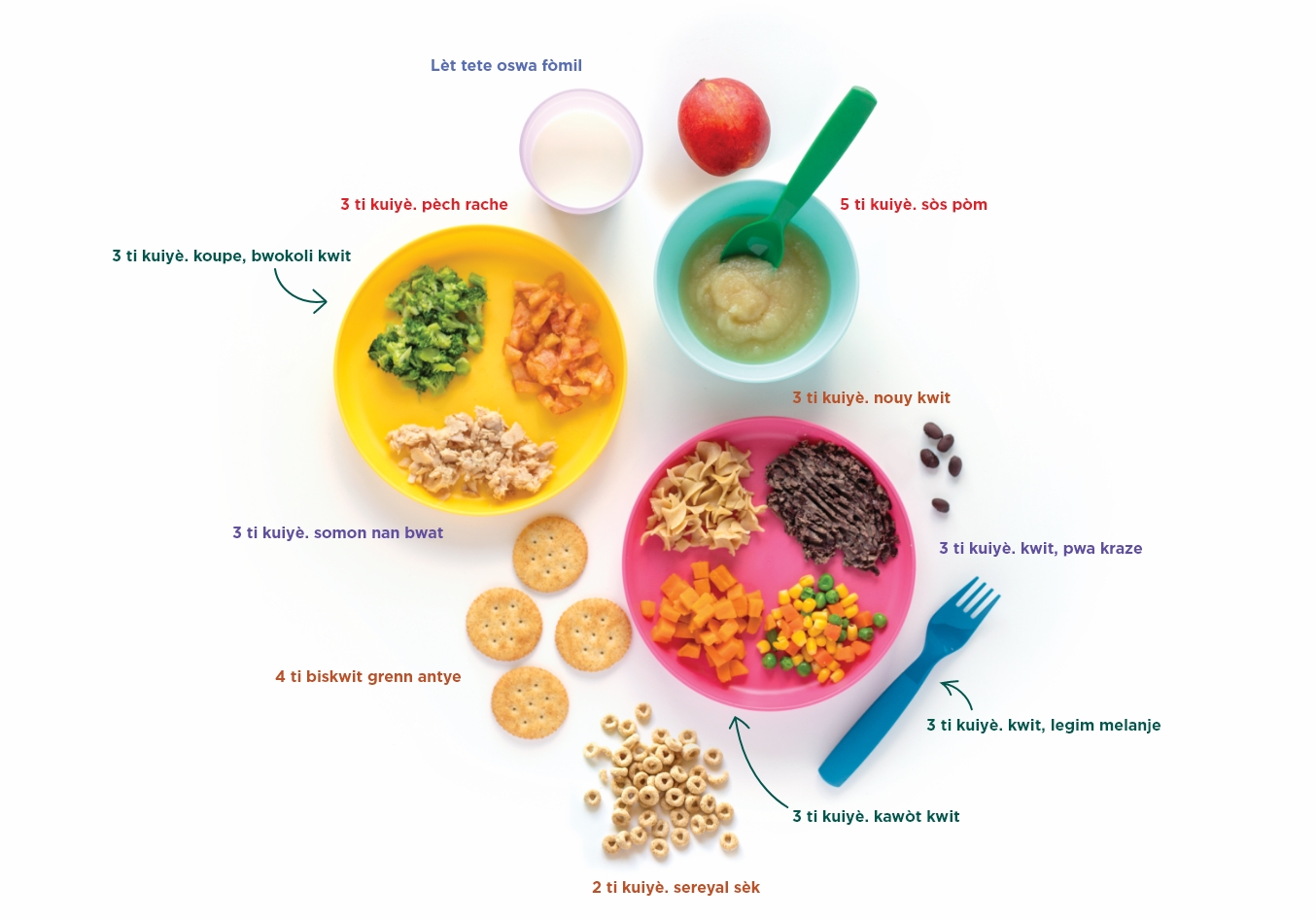
3-4 gwo kiyè chak jou.
Fwi fre, kale, ak nan pòsyon gwosè yon kout dan.
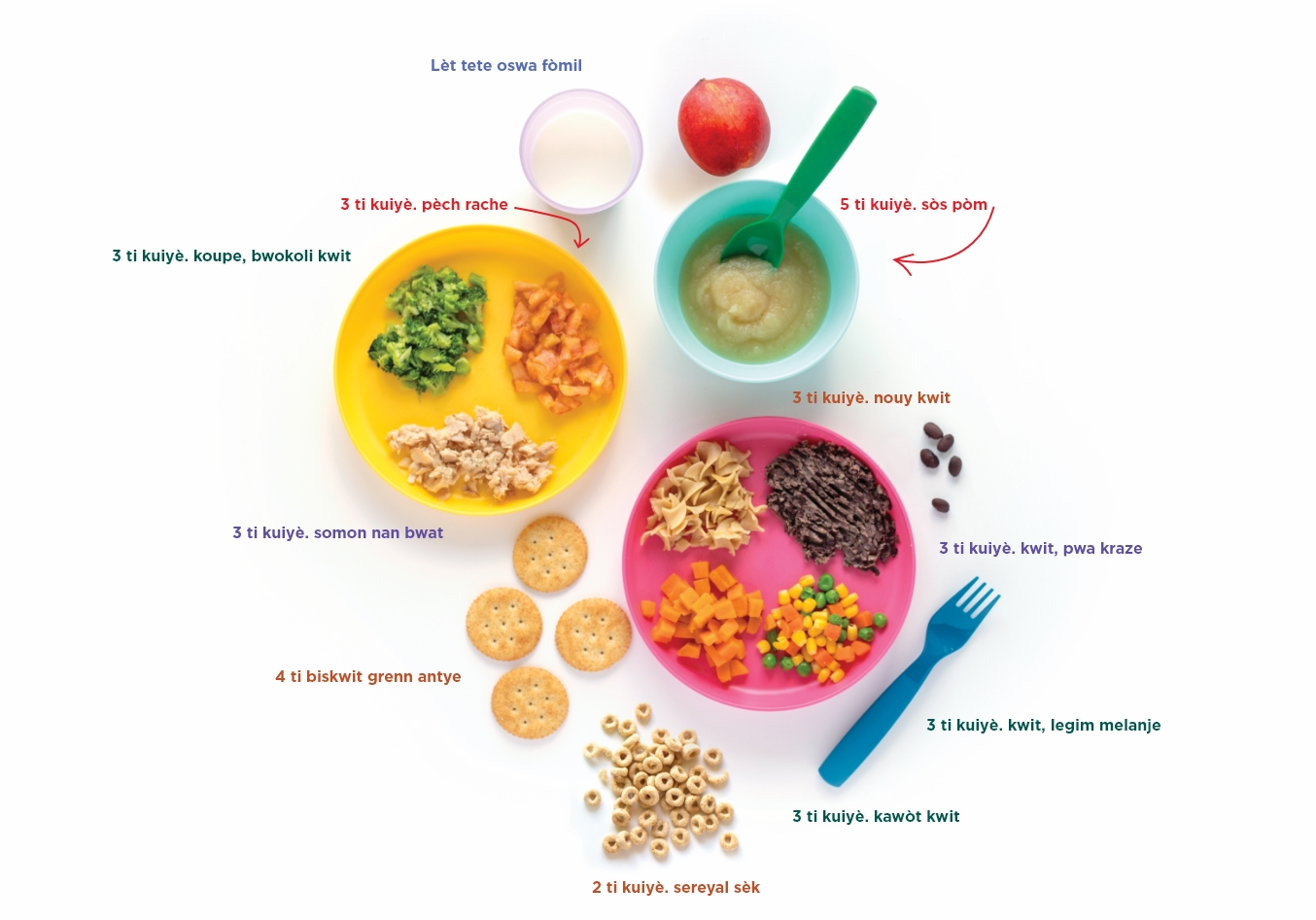
2-4 gwo kiyè chak jou.
Vyann ki byen rache, koupe oswa vyann ki koupe an kib, bèt volay, ze, pwason, oswa pwa kraze kuit.
Manba fen, lis.
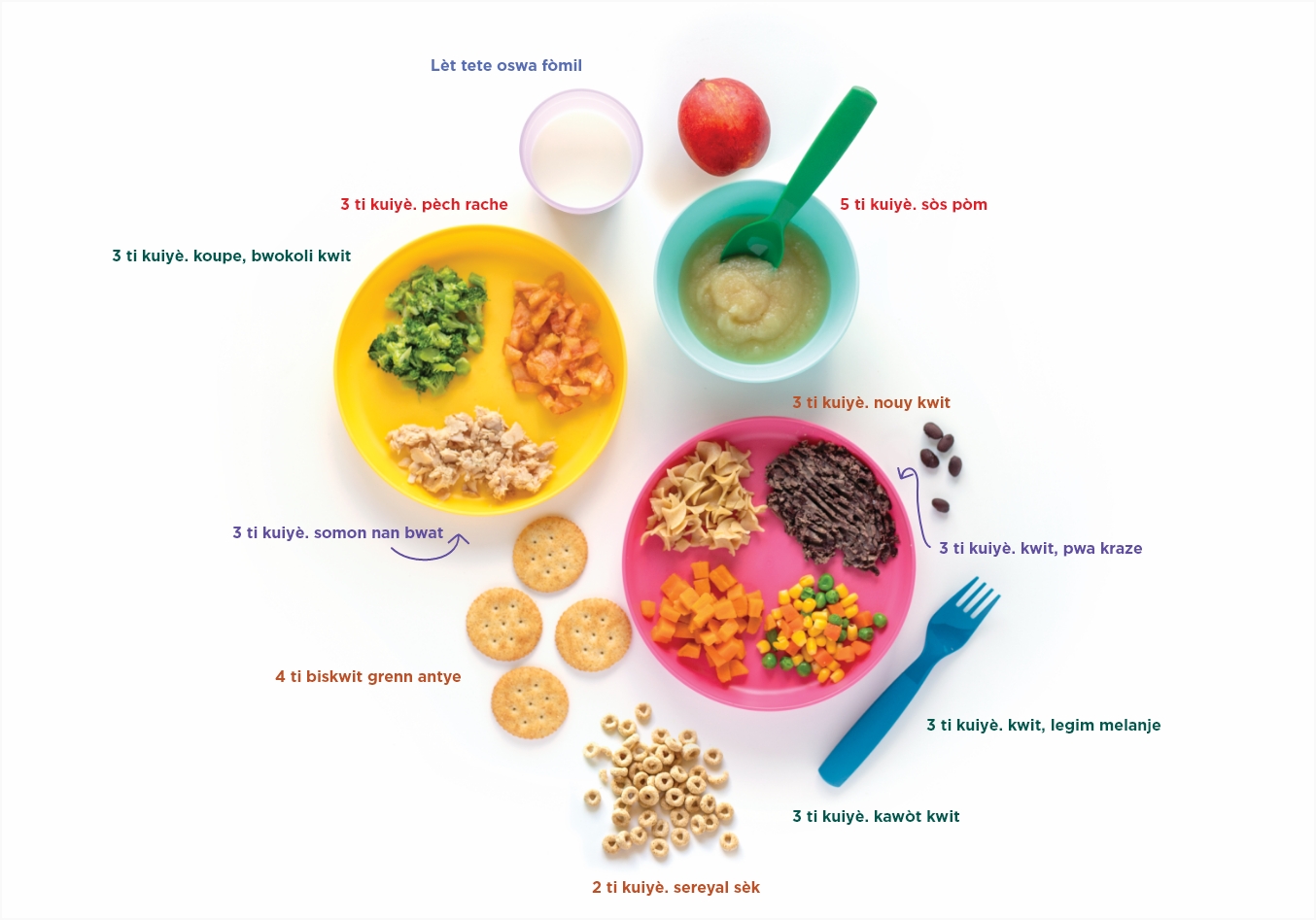

Anviwon 2-3 semèn, 6 semèn, 3 mwa, ak 6 mwa daj, ti bebe yo ka fè fas ak yon pouse kwasans lè yo manje pi souvan.
Pandan y ap grandi ti bebe yo ka kenbe plis lèt, kidonk lè ant chak repa vin gen plis eka epi yo pran mwens tan.
Pou anpeche l toufe, toujou kenbe tibebe w la lè w ap ba li manje. Pa janm soulve yon bibwon lè w ap bay manje.
Kòmanse ofri lèt antye lè tibebe w la gen yon lane.

Pou anpeche l toufe, toujou kenbe tibebe w la lè w ap ba li manje. Pa janm soulve yon bibwon lè w ap bay manje.
Eseye yon sèl nouvo manje alafwa. Tann 5 jou anvan ou eseye yon lòt nouvo manje pou siveye alèji. Alèji ak yon manje ka gen ladan souf anlè, gratèl, oswa dyare.
Prezante manba anviwon 6 mwa. Gaye yon ti manba oswa nwa fen sou yon ti bonbon sèl. Veye tibebe w la pou wè si gen nenpòt reyaksyon pandan 2 èdtan apre yo.
Tibebe ki poko gen yon lane PA ta dwe bwè siwo myèl oswa manje ki ka lakòz yo toufe tankou nwa oswa rezen antye.
Tout tibebe yo diferan. Pale ak WIC oswa pwofesyonèl swen sante tibebe w la sou bezwen tibebe w la.





